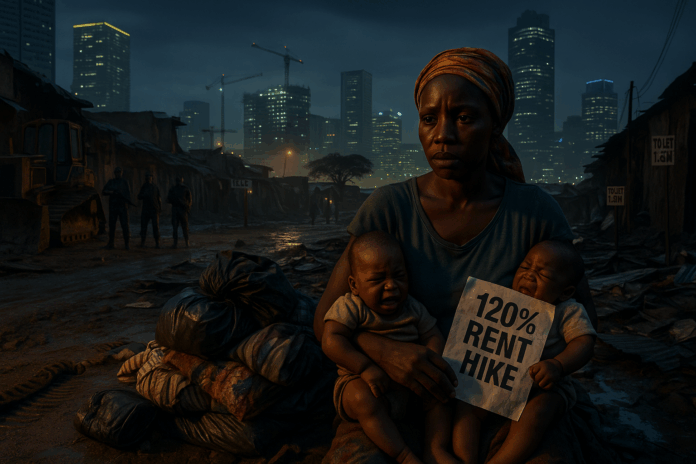Lagos isn’t just facing a housing crisis—it’s experiencing full-blown humanitarian collapse. Imagine a city where 80% of its 20+ million residents are renters, where families routinely spend 50% of their income just to keep a roof overhead. Now picture landlords handing out rent increase notices of 120% overnight, sparking waves of mass evictions. This is Lagos in mid-2025. The trigger? A brutal convergence of predatory leasing practices, a controversial new construction levy, and systemic policy failures. As inflation rages and the naira hemorrhages value, the most vulnerable are being priced out of survival. This isn’t merely about economics—it’s about dignity, stability, and the unraveling of Africa’s most populous metropolis.
Anatomy of the Crisis: Triggers & Drivers
In early 2025, the Nigerian government imposed a new levy on building materials—cement, steel, roofing—that spiked developers’ costs by 30–40%. Overnight, landlords weaponized this as justification for “inflation adjustments,” passing the burden directly to tenants. Cement prices alone exploded from ₦3,000 to ₦10,500 per bag, making new affordable housing projects financially unviable. The result? A rental market where landlords operate with impunity, treating tenants as ATMs.
Lagos adds approximately 3,000 residents daily but builds a mere fraction of the 700,000 annual housing units needed nationally. High-end developments dominate neighborhoods like Lekki and Victoria Island, while affordable housing is abandoned. This isn’t accidental neglect—it’s policy failure. The Renewed Hope Cities initiative launched just 3,112 units in Abuja, a drop in the ocean for a 28-million-unit national deficit. With vacancy rates near zero, landlords exploit scarcity like cartels.
Section 37 of Lagos’s Tenancy Law 2011 theoretically allows tenants to challenge hikes, but enforcement is a cruel joke. Landlords in non-exempt areas impose 100–200% increases, while luxury enclaves operate as lawless zones. One Victoria Island tenant reported a 200% rent surge in 2024 alone. Legal challenges require Form TL11—a process few can afford amid survival triage.
Human Toll: Evictions & Displacement
Bulldozers and armed “area boys” erased an entire community overnight—9,000 residents rendered homeless in Ilaje-Otumara. Churches, businesses, and homes were demolished despite a 2017 court ruling deeming such actions unconstitutional. Naval forces gave 4,500+ fishing-community residents in Tarkwa Bay one hour to evacuate before reducing their homes to rubble. Many still sleep under bridges today.
Yemisi Odusanya, a Lekki resident facing eviction, describes the human impact: “My landlord raised our rent 120% after my twins were born. Where do I go with seven people?” Jimoh Saheed, a personal trainer in Ikoyi, recounts his displacement as emotional warfare: “After a 150% hike, I moved to the mainland. Now my kids changed schools, and I commute four hours daily. I work more but earn less.” His story mirrors thousands commuting from satellite towns like Mowe and Epe, where rents are “cheaper” at ₦450,000–₦600,000 for two-bedroom units—still devouring 65% of average incomes.
Systemic Enablers of the Emergency
The 2011 Tenancy Law is a paper tiger. It exempts luxury areas, lacks percentage caps, and its enforcement is paralyzed by bureaucracy. As legal experts confirm, laws are rarely enforced without lawsuits—and tenants can’t afford the fight. Even the Lagos Assembly’s 2025 push to activate Section 37 remains stalled, while the state’s 3-million-unit housing deficit yawns wider.
Nigeria’s inflation and the naira’s freefall have landlords demanding dollar-equivalent rents. Property managers argue, “Our expenses are dollar-denominated,” justifying 100% hikes. New transit projects like the Lagos-Ibadan rail inflate property values along corridors, pushing out communities like Okokomaiko and Mushin. The result? A city segregated by income, where the rich capture progress and the poor inherit displacement.
Pathways to Solutions: Urgent Interventions
Lagos must follow Enugu State’s 2025 precedent—cap increases at 10–15% annually and criminalize retaliatory evictions. Demolitions should halt until resettlement protocols comply with UN standards. Forced displacements like Ilaje-Otumara must never recur.
Tax breaks for builders using Nigerian-made cement, bamboo, and recycled materials could slash costs by 30%. The Ministry of Housing’s planned materials manufacturing hubs in six geopolitical zones must fast-track this. Developing 50,000-unit townships in Ikorodu or Epe with integrated schools, clinics, and transit is critical. The Renewed Hope Estates program requires scaling from 3,000 to 500,000 units via a ₦500bn budget—not today’s anemic ₦50bn allocation.
Converting rental payments into ownership equity over 5–10 years offers a ladder out of generational renting. Collective bargaining groups could negotiate fair leases and monitor violations. Free eviction defense models need urgent scaling across communities.
Global Precedents & Local Adaptations
Dubai’s Real Estate Regulatory Agency caps increases at 5–20% based on local averages and fines non-compliant landlords. Lagos could install a rental arbitration panel within its real estate regulatory authority. Nairobi’s $6,000 steel-frame units housing 4–6 people offer solutions for Lagos’s coastal poor. With 47.25% rental inflation, such rapid-deployment housing isn’t optional; it’s triage.
A Call for Coordinated Action
Lagos’s housing emergency demands wartime mobilization: immediate rent controls, accelerated social housing, and inclusive urban planning. Without intervention, the UN predicts 40% of Lagosians will live in informal settlements by 2030. The Lekki cookbook author, the Ikoyi trainer, the Ilaje fisherman—they aren’t statistics. They are citizens screaming: “We’re not saying we won’t go—just don’t treat us this way.” Housing isn’t a luxury; it’s a fundamental right. The time for half-measures is over.


